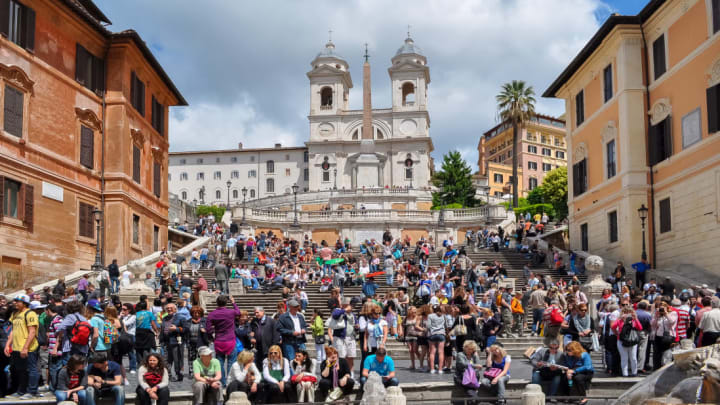“I was just sitting here doing nothing” won’t get you out of trouble if a police officer blows their whistle at you on Rome’s Spanish Steps. In fact, just sitting there is the problem. Mayor Virginia Raggi and the rest of the Roman government recently passed a number of regulations to help preserve the city’s historical landmarks, which includes banning visitors from plopping down on the scenic stone steps.
The 18th-century Spanish Steps connect the Santissima Trinità dei Monti Church at the top with the Piazza di Spagna square below. The steps recently received a $1.7-million restoration funded largely by luxury brand Bulgari, which has operated a shop in the square since 1884. As Forbes explains, officers can now fine you up to $450 for failing to move along or soiling the steps in any way.
Some people think the sitting ban is extreme—Roman newspaper Il Messaggero opined that photos of the empty stairs conveyed “desolation” rather than strength, as reported by The New York Times—but most officials support the new rule. It’s not really sitting that proves most problematic, but rather the propensity for tourists to use the stairs as a place to take a snack or drink break. As David Sermoneta, the president of the Piazza di Spagna Trinità dei Monti Association, told The New York Times, “You couldn’t walk around the Metropolitan Museum snacking on food and slurping a Coke. We expect the same for the center of Rome.”
“Those restorations cost,” one police officer told The New York Times while gesturing to an apparent ice cream cone stain on the stairs. “Why shouldn’t we watch over the city’s monuments?” It’s safe to say that if Roman Holiday (1953) had been filmed this year, Audrey Hepburn wouldn’t have enjoyed her own ice cream cone while perched on the stairs.

It’s not the only iconic film scene that the new laws would’ve foiled—Anita Ekberg’s sensual soak in the Trevi Fountain during La Dolce Vita (1960) would run her a $500 bill today. The city has also tightened restrictions on prostitution, mistreatment of animals, the sale of alcohol, and graffiti. The New York Times reports that according to Rome’s website, the rules aim to forbid behavior that is “not compatible with the historic and artistic decorum” of Rome in order to “guarantee decorum, security, and legality.”
But don’t let the stricter policies put a damper on your enthusiasm to experience all that Rome has to offer. Luckily, gelato is easy enough to eat on the go.
[h/t Forbes]
